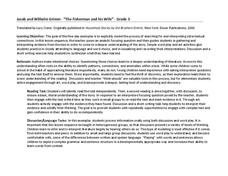Curated OER
Eastside Literacy Reading Lesson - Fact or Opinion
Analyze critical thinking skills that involve the ability to distinguish between fact and opinion through self-reflection. Higher education students will collect a newspaper article, advertisement, magazine article, tabloid article,...
The New York Times
News and News Analysis: Navigating Fact and Opinion in the Times
Help your class understand the difference between fact and opinion by exploring the New York Times homepage and articles. In pairs or small groups, pupils complete a scavenger hunt, answering the provided questions. Next, discuss the...
Newseum
Editorials and Opinion Articles
Reading the news is fun, and that's a fact! With the lesson plan, scholars differentiate between fact and opinion as they read editorial articles. They complete a worksheet to analyze the information before writing their own editorials...
University of the Desert
Fact and Opinion within the Media
How can the media foster cultural misunderstandings? These activities encourage learners to distinguish between fact and opinion in the media
Curated OER
Opinion Poll-arities
Students explore the mathematics behind opinion polls, as well as provides a framework for interpreting trends in opinion poll graphics.
iCivics
Mini Lesson: Supreme Court Opinions
The court of last resort. Historians research, using current cases and issues, the impact the Supreme Court of the United States has on how our nation operates. They analyze recent decisions made by the nine judges and determine how the...
Curated OER
Fact or Opinion-Manatees
Students decipher factual information about manatees. In this biological science activity, students research characteristics about manatees. They use that information to separate facts from common opinions about the animals. Students...
EngageNY
Mid-Unit Assessment: On-Demand Writing – Conflicting Interpretations of the 13th and 14th Amendments
The authors of the court's decision and the dissenting opinion on Plessy v. Ferguson disagreed on their interpretations of the Thirteenth and Fourteenth Amendments. Scholars set out to show how with an on-demand writing prompt. They...
EngageNY
Studying Conflicting Interpretations: Perspectives on Plessy v. Ferguson: Part 3
Scholars closely read Justice John Marshall Harlan's dissenting opinion in the Plessy v. Ferguson case, seeking to understand why he disagreed with the court's decision that racial segregation laws for public spaces were constitutional....
Curated OER
Inferences/Opinions
Fourth graders practice making inferences and forming opinions. In this reading strategy lesson, 4th graders listen to the book Woodsong by Gary Pauisen. They make predictions about the story before beginning and discuss the story as...
Curated OER
The Fisherman and His Wife
Engage conversation and explore the journey as you challenge young readers to interpret the german folktale, "The Fisherman and His Wife" written by literary brothers Jacob and Wilhelm Grimm.
Curated OER
The Buzz about Fact and Opinion
Students distinguish facts from opinions. In this biological science lesson, students research information on bees to decipher what things are proven true versus assumed. They view a video and discuss what makes the information...
Curated OER
"All Together Now" by Barbara Jordan
Cover the topic of race relations with these questions that go with Barbara Jordan's persuasive speech "All Together Now." These reading questions ask readers to think about her speech in a variety of ways by analyzing particular words...
Curated OER
Determining Author's Point of View: The Sneeches
Determine the author's point of view in a text. Young readers read Dr. Seuss' The Sneeches and identify the author's purpose in the story. They identify persuasive techniques in writing, asking and answering questions to better...
Curated OER
Interpreting Christopher Columbus
High schoolers compare historical interpretations. For this research skills lesson, students use Internet and print resources to research the controversy regarding Christopher Columbus's work as an explorer. High schoolers use their...
Curated OER
Good News/Bad News/Who Cares?
Young scholars practice evaluating facts, bringing to bear their own experience, preferences, and international contexts. They recognize that there are many ways of interpreting a single piece of information and form the habit of...
Curated OER
School Newspaper
Fifth graders run a school newspaper on a school website and discover how to use various literary forms as they relate to the writing process. For this school newspaper lesson, 5th graders synthesize information from different sources,...
Georgetown University
Cup-Activity: Writing Equations From Data
Determine how cup stacking relates to linear equations. Pupils stack cups and record the heights. Using the data collected, learners develop a linear equation that models the height. The scholars then interpret the slope and the...
Curated OER
Funny or Not - Your Opinion
Students interpret and judge the meaning of a political cartoon. They dicuss the cartoons in groups and write an evaluative paragraph which they present to the class.
Benjamin Franklin Tercentenary
Reading the Work of B. Franklin, Printer
Placing Ben Franklin’s ideas about a free press next to those embodied in the First Amendment sheds light on both. Learners interpret and compare two primary sources and then examine them in the light of a contemporary survey about...
National Endowment for the Humanities
James Madison: Raising an Army—Balancing the States and the Federal Government
To war! To war! Every nation in the history of the world has had to deal with warfare on some level. Scholars go through a series of activities and discussions surrounding the development of the Constitution to help them better...
Curated OER
Literature Review
Here's a great game that will help your class review a book or unit before an exam. Three pupils act as judges while two teams take turns responding to your knowledge, interpretation, and judgement questions. Complete directions for the...
Education Development Center
Interpreting Statistical Measures—Class Scores
Explore the effect of outliers through an analysis of mean, median, and standard deviation. Your classes examine and compare these measures for two groups. They must make sense of a group that has a higher mean but lower median compared...
Curated OER
Information from Posters
Budding journalists examine and evaluate an informative poster advertising a public meeting to discuss city park issues. They write a paragraph explaining what they found to be effective and ineffective about the poster, then imagine...

























